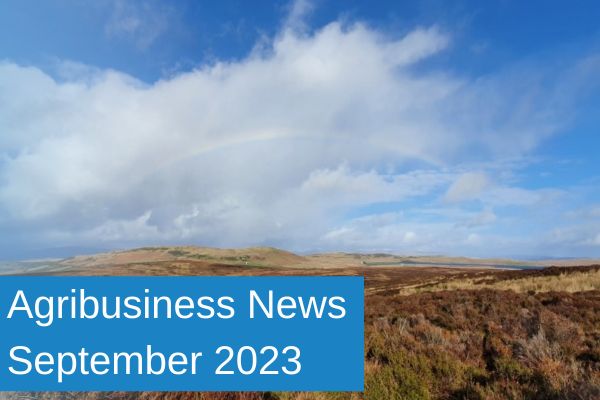Agribusiness News September 2023 – Policy Brief
1 September 2023Photo Identification needed to buy Ammonium Nitrate
Under the amended Home Office Control of Poisons and Explosives Precursors Regulations 2023, from the 1st of October 2023, farmers, crofters and land managers will be required to provide photographic identification to purchase ammonium nitrate (AN) fertiliser with a nitrogen content of 16% or more. This applies to compounds, blends, and N:P:K fertilisers containing AN above the 16% threshold. Blends containing straight AN with a base concentration of 34.5% will be over the threshold even if the resultant blend is declared at less than 16% N.
In seeking to tighten the controls for poisons and chemicals which can be used to make explosives known as ‘explosive precursors’, the UK Government has updated the Poisons Act 1972 to include new chemicals to the list of reportable and regulated substances. As a consequence, businesses supplying what are deemed to be explosives precursors to professional users and other businesses must verify the legitimacy of the individual or business, hence the requirement for photographic ID. Examples of photographic identification can include: passport, driving licence, trade identification card, business ID card.
Other Statutory information that will be required to purchase fertilisers with an AN content of 16% or greater will be:
- The name and address of the purchaser (individual or named representative of a business);
- A statement of the nature of the business customer’s trade, business or profession, or of the public function that the individual/company performs, and;
- If VAT registered, the business customer’s VAT registration number.
While under the 2023 Regulations, the required information does not need to be physically presented in person. As all the information must be recorded and retained for 18 months and available for a police inspection, retailers may require photographic ID to be provided in person to ensure authenticity of the purchaser rather than a photograph of the ID being attached to an email. For further information of the forthcoming legislative changes, please see online at GOV.UK
The Wildlife Management and Muirburn Bill
With the shooting season underway, the Wildlife Management and Muirburn Bill currently at stage one of its journey through the Scottish Parliament is seeking to implement recommendations for increased grouse moor management and trap regulation, as set out in the in December 2019. While sustainable grouse moor management provides conservation benefits, particularly for ground-nesting birds, birds of prey, rare moorland plants and pollinators the Bill aims to address illegal targeting of birds of prey and ensure that the management of grouse moors and related activities are carried out in an environmentally sustainable way.
Under the current proposals, if the Bill is passed, stricter rules will be introduced for muirburn, a licence will be required to shoot red grouse and the use, purchase and possession of glue traps will be banned, and new licensing and training requirements will be introduced for certain types of wildlife traps.
As part of the ongoing consultation process, the Scottish Government is currently seeking the public’s views on whether there should be an outright ban on the use of snare traps, or if any exemptions should be considered. Equally, opinion is being sought on extending the investigative powers of the SSPCA which would involve giving inspectors more authority to search, examine and seize any evidence relating to incidences of illegal hunting and other offences. For further information, please see online at: Protecting Scotland’s wildlife – gov.scot (www.gov.scot). The consultation period ends on the 3rd October 2023.
Animal Health and Welfare support now open for claims
If you have undertaken the Animal Health and Welfare activities included in Preparing for Sustainable Farming (PSF) Support, you can now make a claim at www.ruralpayments.org. Any farming or crofting business that has an active Business Reference Number, is Rural Payments and Services online registered, and has a flock/herd number can undertake up to two interventions in each scheme year of the Programme. Each intervention will attract a standard payment of £250, with the first claim an additional £250 to cover personal development. The online claim platform has now been updated to allow claims for AHW claims to be submitted in addition to carbon audit and soil analysis support.
Further details of the funding available under Preparing is available on the Rural Payments Website
Sign up to the FAS newsletter
Receive updates on news, events and publications from Scotland’s Farm Advisory Service

